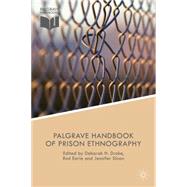With a foreword by Professor Yvonne Jewkes, University of Leicester, UK.
The Palgrave Handbook of Prison Ethnography provides an expansive overview of the challenges presented by qualitative, and particularly ethnographic, enquiry. The chapters reflect upon the means by which ethnographers aim to gain understanding, make sense of what they learn and the way they represent their finished work. The Handbook offers urgent insights relevant to current trends in the growth of imprisonment worldwide. In an era of mass incarceration, human-centric ethnography provides an important counter to quantitative analysis and the audit culture on which prisons are frequently judged.
The Handbook is divided into four parts. Part I ('About Prison Ethnography') assesses methodological, theoretical and pragmatic issues related to the use of ethnographic and qualitative enquiry in prisons. Part II ('Through Prison Ethnography') considers the significance of ethnographic insights in terms of wider social or political concerns. Part III ('Of Prison Ethnography') analyses different aspects of the roles ethnographers take and how they negotiate their research settings. Part IV ('For Prison Ethnography') includes contributions that convincingly extend the value of prison ethnography beyond the prison itself.
Bringing together contributions by some of the world's leading scholars in criminology and prison studies, this authoritative volume maps out new directions for future research. It will be an indispensable resource for practitioners, students, academics and researchers who use qualitative social research methods to further their understanding of prisons.
The Palgrave Handbook of Prison Ethnography provides an expansive overview of the challenges presented by qualitative, and particularly ethnographic, enquiry. The chapters reflect upon the means by which ethnographers aim to gain understanding, make sense of what they learn and the way they represent their finished work. The Handbook offers urgent insights relevant to current trends in the growth of imprisonment worldwide. In an era of mass incarceration, human-centric ethnography provides an important counter to quantitative analysis and the audit culture on which prisons are frequently judged.
The Handbook is divided into four parts. Part I ('About Prison Ethnography') assesses methodological, theoretical and pragmatic issues related to the use of ethnographic and qualitative enquiry in prisons. Part II ('Through Prison Ethnography') considers the significance of ethnographic insights in terms of wider social or political concerns. Part III ('Of Prison Ethnography') analyses different aspects of the roles ethnographers take and how they negotiate their research settings. Part IV ('For Prison Ethnography') includes contributions that convincingly extend the value of prison ethnography beyond the prison itself.
Bringing together contributions by some of the world's leading scholars in criminology and prison studies, this authoritative volume maps out new directions for future research. It will be an indispensable resource for practitioners, students, academics and researchers who use qualitative social research methods to further their understanding of prisons.








